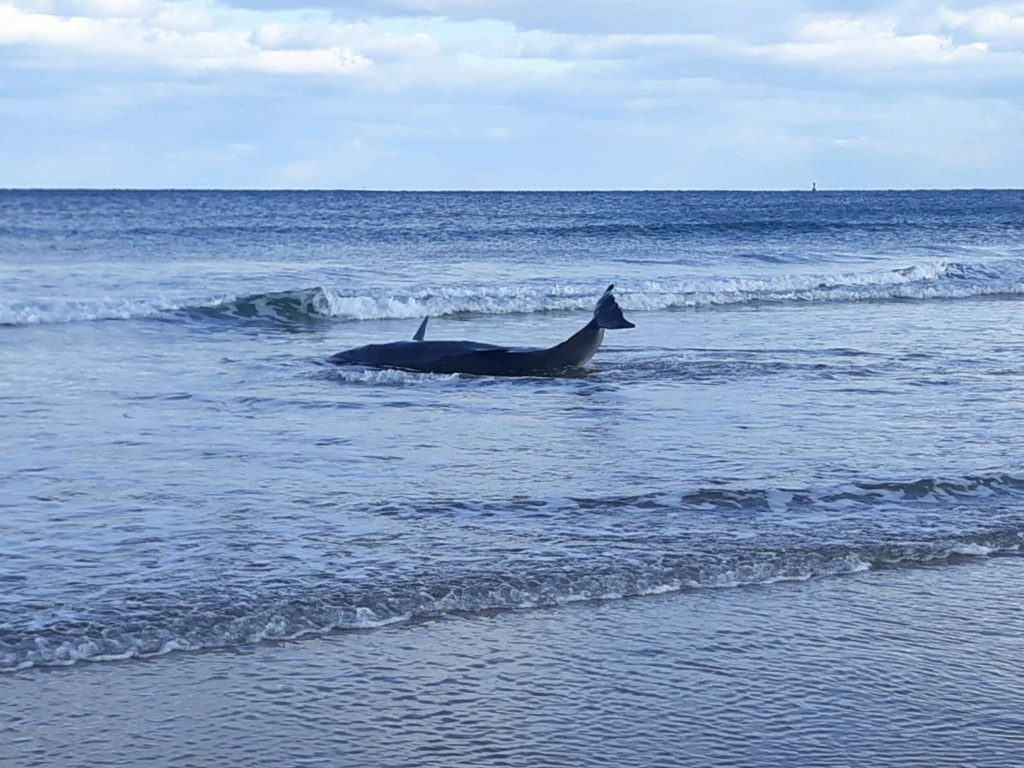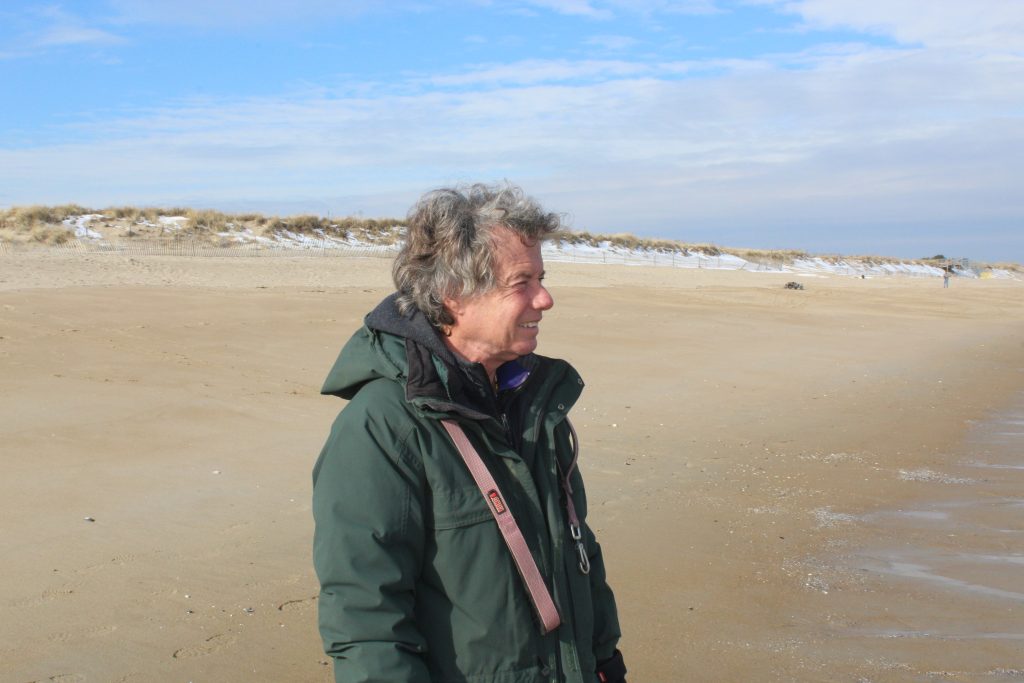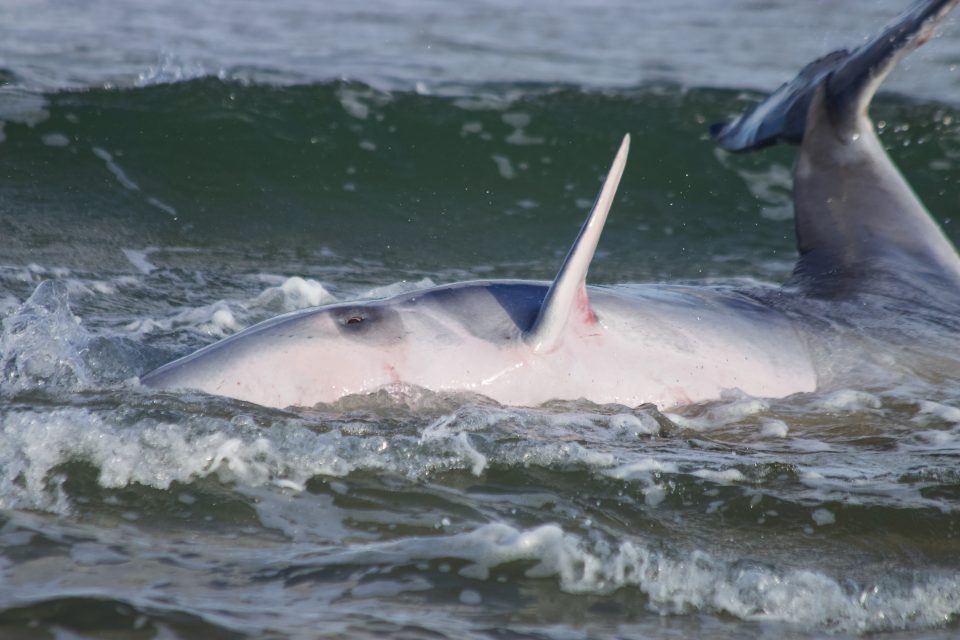SALISBURY BEACH – Mike Paige was preparing to teach a business law course at Bentley College when he got a text last week from the Marine Mammal Rescue Team at the Seacoast Science Center in Rye, NH, asking him if he could help a stranded mammal on the beach.
Paige, a volunteer rescuer and avid surfer, who lives in Newburyport, has helped a variety of animals in trouble on the beach from seals to seagulls. With his winter water gear in hand, he went looking for what turned out to be an adult male pygmy sperm whale that was a long way from its home in the deep ocean.
When Paige arrived at the Salisbury Reservation, the nine-and-a-half-foot whale had drawn a crowd, including a Department of Conservation and Recreation staffer and a wildlife officer.
The whale probably weighed about 700 pounds, although no one was about to weigh it. Its powerful tail would break a human’s leg, said Brian Yurasits, the rescue team’s community outreach manager.
[The Marine Mammal Rescue Team responds to reports of marine mammals from Essex to the Maine border. If you see any marine mammal on the beach, dead or alive, call the hotline at 603-997-9448.]

Photo by Mike Paige
In a detailed account written at the request of The Town Common, Paige told an amazing story.
“The poor whale was in about a foot or two of water trying to free itself. It was thrashing its tail around. It would turn from its right side to its left side and push with its tail. It was unable to free itself.”
In the process of struggling, the whale was incurring abrasions to its pink belly and its fluke.
“It was heartbreaking to see such a majestic animal struggle so,” Paige wrote.
Bystanders wanted to try to push the whale back out into deeper water. But Paige told those in the crowd, including an onlooker who got close to shoot a photo with her camera, to stay back for their own safety. It is also against the law to get within 150 feet of a whale.
“Wales are mammals. They breathe air. If you push a seal or whale into the water, you could be destining it to drown,” Paige said.
Seals and dolphins have been drowned by well-intentioned humans.
“It’s not unusual to see a seal on the beach. It’s what they do,” Paige wrote. “I say that ‘people love seals to death,’ because they really do.”
Paige wrote. “That’s why I say, ‘leave it to the experts.’”
The experts, staff members from the Science Center’s Marine Mammal Rescue, were enroute to assess the whale’s health. Ashley Stokes, director of the rescue, and her team arrived quickly, around 1 p.m.
“It is a very rare occurrence to see a pygmy sperm whale,” Yurasits said. In his eight years at the rescue center, he has seen a pygmy sperm whale only once before.
These whales live in the deep ocean hundreds of miles from land. “Even most fishermen have not seen one of these,” Yurasits said.
The team tried to tag the whale so they could follow its movements, if it managed to return to the deep or beached itself elsewhere. But getting that close to the thrashing whale was too dangerous.

Photo: Stewart Lytle / The Town Common. Mike Paige
The team consulted with its veterinarian, Dr. Stephanie Andruskevich in Amesbury, and its partners, the National Oceanic and Atmosphere Administration, the New England Aquarium and the International Fund for Animal Welfare.
The consensus was that the whale might have a medical condition that led it to land. Pygmy sperm whales are susceptible to cardiomyopathy, heart disease, Yurasits said. They thought the whale might have beached itself to die.
As the tide came in, the waves pushed the whale further onto the sand. “You could watch the whale blow water out of its blowhole and breathe in air,” Paige said.
When someone alerted the bird watchers network that a whale was on the beach, more humans arrived, bringing giant camera lenses and tripods.
The rescuers spent the afternoon watching and hoping the tide would bring enough water under the whale that it could swim out to the deep. But that did not happen.
The January sun was setting. Seagulls circled, planning a feast when the whale succumbed.
“By the time we left, you could tell that the whale was getting tired and losing some of its strength,” Paige wrote. “You could observe it growing weaker and weaker throughout the day. I think we were hopeful, but realistic with the poor prognosis.”
The rescuers considered putting the whale out of its misery with euthanasia, but that was ruled out for fear it could slip back into the ocean where predators would be poisoned, eating its carcass.
That night, Mike could not get the little whale out of his mind, so, he drove back to the Salisbury Reservation. When he arrived, the beach was dark and cold. The tide was in, and the whale was gone.
“I was overjoyed thinking that it was able to free itself and go back to the deeps where it belongs,” Paige recalled. “What a celebration I had in my head. I walked north first to double check. No whale. I walked south back towards the Salisbury jetty. And there it was a little further south than it was originally.”
Thinking the whale must be dead, he almost fell to his knees.
“The emotional roller coaster, to go from the heights of thinking it freed itself to the trough of it being dead was intense. It was just about high tide and the whale was now being washed up on the beach like a dead fish with waves crashing on top of it, it’s body rolling from side to side. There was no more struggling or fluke slapping from the whale,” Paige wrote. “He had nothing left.”
Then, he moved.
That’s when the already unusual story took a crazy turn.
Paige crouched on the sand and began talking to the whale.
“I explained to the whale that I understood it was tired from struggling so much, but not to give up. I said that it was high tide and this was its last chance to get free. I let it know that a lot of people, animals and other energy bearers were pulling for it. I told it that today wasn’t its day to die,” he wrote.
Paige, who describes himself as not a religious person, but one who believes in the power of prayer or positive vibes, called on the sun, moon, stars, plants, animals, rocks and sand to help him. He asked the heavens and earth for strength for the whale.
“I waved my arms up to the sky and gathered everything I could. I gave it all to the whale,” he wrote.
Admitting it sounds “cuckoo,” he was convinced that the whale understood. He imagined that he missed its pod and really did not want to die on the beach.
Paige urged the whale to try one more time. “This was it,” he wrote. “It was now or never.”
As if it understood, the whale flapped its fluke twice — and freed itself.
“I’m not ashamed to say that tears streamed down my face. My salty tears a gift to the salty ocean. He was afloat, albeit barely,” Paige said.
The whale seemed confused. “This whale may never have touched land prior, never had its body supported by the earth or the sea bottom,” he wrote.
Paige yelled at the whale to go the other way, back to the deep ocean, away from shore. He ran along the beach telling the whale to go.
Then it happened. “I saw it swim off right beneath the surface, fluke slapping, fin and back breaking the surface until it was out of sight. I sensed gratitude from him,” Paige wrote.
The next morning, he walked the beach searching for the whale, but found no whale.
“Maybe that’s me superimposing my humanity on an animal. Maybe it’s human delusions of grandeur. Maybe it was nothing more than a coincidence that it freed itself when I channeled and transferred everything I was able to muster and gather from the earth, heavens and ocean to it. Just a coincidence of timing, some may say. Maybe it was scared of me, and that’s why it freed itself. I’ll never know for sure,” Paige wrote.
“But I do know what I thought and felt. We spoke,” he wrote, attributing the whale’s return to the deep to “the power of love.”
For more information on this elusive species, visit: https://www.fisheries.noaa.gov/species/pygmy-sperm-whale
To learn about the Seacoast Science Center and its Marine Mammal Rescue, visit https://www.seacoastsciencecenter.org/marine-mammal-rescue




